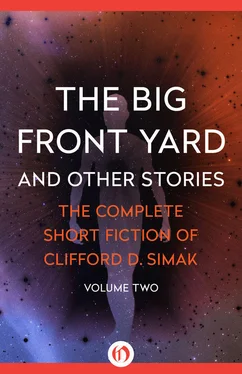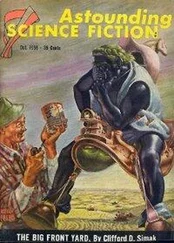Without knocking, Carson pushed open the back door, stepped into the smoke-filled room.
Three men stared at him from a single round table decorated by two whisky bottles, staring with that suddenly vacant, vicious stare that marks an interrupted conversation.
One was Fennimore, a huge man, wisps of black hair hanging out from under his broad-brimmed hat. Quinn and Bean were on either side of him.
For a moment the stare was unbroken and the silence held. Fennimore was the one who broke it. “What do you want?” he asked, and his voice was like a lash, hard and cold and with a sting in every word.
“I came,” said Carson, “to see what was being done about Delavan’s murder.”
“So,” said Fennimore slowly. “So, what do you want to be done about it?”
“I want the man who killed him found.”
“And if we don’t?”
“I’ll say that you don’t want him found. On the front page of the Tribune.”
“Look here, Morgan,” said Quinn, “you’re in no position to say that. When you yourself are wanted for murder.”
“I’m here,” said Carson. “Go ahead and take me.”
The three sat unmoving. Fennimore’s tongue licked his upper lip, briefly. Bean’s whisky-flushed face drained to pasty white.
“No,” said Carson. “All right, then –”
“Quinn,” interrupted Fennimore, “gave you until tomorrow morning to get out of town. That still holds.”
“I’m not getting out,” said Carson. “The day when you can tell a man to get out and make it stick is over, Fennimore. Because in another week we’re electing a new sheriff, one who will uphold the law of the country and not the law of one cow-boss.”
“It’s your damned paper,” snarled Fennimore. “You and your lousy stories that give me all the trouble. Stirring up the people –”
“What Fennimore means,” said Quinn, smiling, “is that you’ll never go to press again …”
“But I will,” said Carson. “Tonight. I’m not waiting until tomorrow. We go to press tonight instead of tomorrow afternoon. And I’m going to tell how Delavan was shot down from ambush and nothing’s being done about it. And I’m going to point out that when I killed a man on fair call this afternoon you wanted to run me in for murder.”
“You can’t blame any of my boys for killing Delavan,” said Fennimore. “Delavan was my friend.”
“He was your friend, you mean,” said Carson, “until he told Quinn this afternoon that he was all through. After that, Fennimore, you couldn’t afford to let him live.”
Fennimore hunched forward in his chair. “If you think you can get me to raise the ten thousand ante,” he declared, “you’re wrong. It was worth that much to get you out of the way, but it’s not worth any more.”
Carson laughed at him, a laugh that came between his teeth.
“You’re still willing to pay that ten thousand?”
Fennimore nodded. “If you leave within the hour. If you get a horse and ride. If you never go back to the office again.”
“I knew I had you scared,” said Carson, “but I didn’t know I could scare you quite so thoroughly.”
Slowly he backed out of the door, closed it and strode across the barroom.
CHAPTER THREE
One Against the Town
Light glowed in the windows of the Tribune and Carson, hurrying across the street, saw the tiny office was filled with men.
Cries of greeting rose as he stepped through the door, and he stopped for a moment to recognize the faces. There was Gordon Purvis, the candidate for sheriff, Jim Owens, Dan Kelton, Humphrey Ross and others. Lee Weaver was there and so was Bill Robinson.
Jake shambled out of the back room, stick of type clutched in one hand, gunbelt joggling on his hip.
“Ain’t you got that damned editorial writ yet?” he demanded. “Holy hoppin’ horntoads –”
“Jake,” snapped Carson, “how soon can you get out a paper? An extra?”
Jake gasped. “A whole paper? A whole danged paper?”
“No, just one page. Sort of a circular.”
“Couple, three hours,” said Jake, “if I can use big type.”
“All right,” said Carson, “get ready for it. I’ll start writing.”
Jake shifted the cud of tobacco to the left side of his jaw, spat at the mouse-hole.
Owens had risen, was making his way toward Carson. “What you planning to do?” he asked, and his question quieted the room so that Jake’s feet, shuffling to the back, sounded almost like a roll of thunder.
“I’m going to blow Fennimore sky-high,” said Carson. “I’m going to force him to produce Delavan’s murderer or face the assumption that it was he, himself, that ordered the killing.”
“You can’t do that,” said Owens, softly.
“I can’t!”
“No, you can’t. This thing is getting out of hand. Range-war is apt to break wide open any minute. You know what that means. Our homes will be burned. Our families run out or murdered. Ourselves shot down from ambush.”
Purvis leaped to his feet. “You don’t know what you’re saying, Owens,” he shouted. “If they want to shoot it out, we have to shoot it out. If we back down this time, we’re done. We’ll never –”
“You’re safe enough,” snarled Owens, “you’re all alone. You haven’t any family to be worried about. The rest of us –”
“Wait a minute,” yelled Carson. “Wait a minute.”
They quieted.
“Do you remember when you came in here six months ago to talk this thing over with me?” asked Carson. “You told me then that if I went with you, you’d string along with me. You swore you wouldn’t let me down. You agreed this was the show-down. You said you wanted Purvis for sheriff and you’d back him –”
“We know that,” yelled Owens, “but it’s different now –”
“Let me talk, Owens,” snapped Carson, his voice like a knife. “I want to tell you something. Something that happened this afternoon. Fennimore offered me ten thousand if I would sell you out – ten thousand, cash on the barrel-head and a promise that I’d get safely out of town. I turned him down. I told him I wouldn’t sell you fellows out. And because I told him that, I have a murder charge hanging over me and Delavan is dead …”
He looked from one to another of them in the deadly quiet, each of them staring in turn at him.
“I refused to sell you men out,” said Carson, “and now you’re selling me out. You won’t back my play. I should have taken that ten thousand.”
Their eyes were shifty, refusing to meet his. A strange fear was upon them.
Kelton said, “But you don’t understand, Morgan. Our wives and kids. We never thought it would come to this –”
From the street outside came wild shouts and the sound of running feet.
“Fire!” the single word ran through the startled night, crashed into the lamp-lighted Tribune office. “Fire! Fire!”
Carson spun toward the window, saw the leaping flames across the street.
“It’s my place!” yelled Bill Robinson. “My store! Every dime I have – every dime –”
He was rushing for the door, clawing at the jamb, sobbing in his haste.
The room exploded in a surge of men leaping for the door. Across the street dark figures of men, silhouetted against the windows, hurdled the porch railing of the North Star, hit the street running. At the hitching posts the horses reared and screamed and pawed at the air in terror.
Flames were leaping and racing through the store, staining the whole street red. Smoke mushroomed like an angry cloud, blotting out the stars. Glass tinkled as a window was shattered by the heat.
Carson pounded through the dust. Running figures bumped into him. Voices bellowed – yelling for pails, for someone to start the windmill.
Читать дальше












